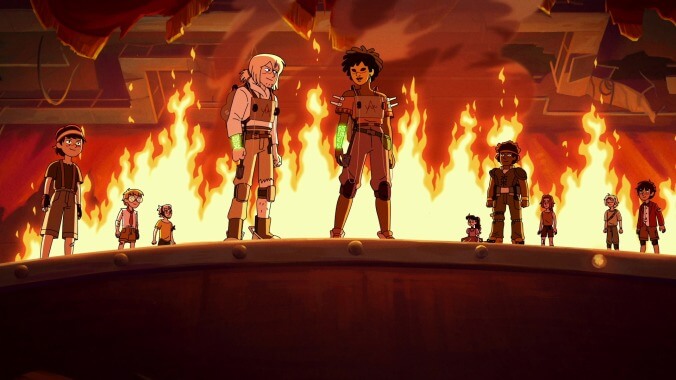All well and good. But what happens when someone doesn’t want to—or isn’t able to—perform that kind of growth? What happens to someone trapped in a reality designed to help them become a better person… and they’re so invested in their misery that they find themselves incapable of change?
That’s the question raised by the show’s third season (chapter, book, etc.), which pulls the wonderful third-season TV trick of taking a world that’s now been fully, thoroughly established, and pushing at the edges of it to see what else can be discovered. Here, that means delving deeper into the origins and philosophy of “The Apex,” a group originally encountered back in the show’s second season. Made up of kids who’ve rejected the Train’s overall message, The Apex are driven by two beliefs: That the creatures encountered in the Train’s various cars, who they dub “Nulls,” aren’t real people—and can thus be dealt with as one pleases. And second, that the only goal in life is to get your number (i.e., the Train’s countdown to personal epiphany, tattooed on every passenger’s arm) as high as humanly possible, often by breaking or killing any Nulls they can get their hands on. These highly destructive Lost Boys and Girls thus spend their days hanging out in a trashed shopping mall (or, at least, a train car that looks like one) and launching raids on other cars under the guidance of their leaders, future Proud Boy wannabe Simon (Kyle McCarley), and charismatic manipulator Grace (Kirby Howell-Baptiste).
In case that “Child cultists launch racist crusades” logline didn’t clue you in, this is a pretty damn dark season of kids’ TV—a descent that’s in line with Infinity Train’s increasingly ambitious emotional scope. The Train itself is just as cheerfully odd and bright as ever, filled with talking rocks and absurdist sight gags. But Simon and Grace, who are separated from their tribe early on, and forced to journey back to the group’s base through a number of fantastical cars, are deeply jaded teens, marked both by their own unresolved issues, and by years spent in world tailor-made to try to force them to play by its benevolent but oppressive rules. Rather than engage with the Train, they’ve learned that it’s easier, and faster, to smash through its obstacles, regardless of the long-term harm that approach might cause. Even when the requisite dose of cuteness arrives, in the form of 6-year-old passenger Hazel (Isabella Abiera) and her gorilla-instrument companion Tuba (Diane Delano), neither Grace nor Simon initially view them with anything but a mixture of opportunity and mistrust.
It’s to Infinity Train’s credit that each of its seasons has gotten more complex in its storytelling, and in the emotional issues they seek to address. The show’s first Book centered on a fairly straightforward story of a young girl learning a mixture of self-acceptance and self-responsibility, while the second Trojan Horse’d a more complicated tale about identity inside a fairly up-front redemption plot. But Book 3 is the most extreme, and ambitious, thing that creator Owen Dennis and his crew have ventured to date, asking audiences to spend a lot of time with protagonists who have done some very real harm to others. In doing so, the show asks pointed questions about where those impulses come from, and what can be done in their aftermath. Through its layers of brightly hued allegorical cover, it speaks on topics of abuse, trauma, racism, grief, tribalism, and more, with a forthright emotionality that refuses to flinch from the heaviness of the things it’s asking viewers to grapple with. It’s a show about learning to see other people as people—a depressingly “political” message in the current planetary climate. When, in a moment of climax, one character blindly demands of another, “Why would I ever want to change, when I’m always right?!” it feels like a gut punch aimed directly at the solar plexus of the American soul.
All that and you still get to hear Kate Mulgrew play a purring, condescending, endlessly sly Cat. (To say nothing of the wonders of The Debutante Ball Car, or the mysteries of the The Hey Ho Whoa Car—the imagination that powers a series where every single car can have its own internal rules and themes is still going strong.) There’s a tricky balancing act to keeping a show this silly, while also taking the feelings of its characters so perfectly in focus. When something does fall by the wayside, it’s usually the series’ plot; the machinations of moving cars and locomotive computer glitches tend to pale in comparison to watching these character work through their trauma and grief. (Or not, as the case sometimes, sadly, may be.) Regardless, though: Book 3 is Infinity Train’s best season to date, and the show’s engine show no signs of slowing down just yet.
























![Rob Reiner's son booked for murder amid homicide investigation [Updated]](https://img.pastemagazine.com/wp-content/avuploads/2025/12/15131025/MixCollage-15-Dec-2025-01-10-PM-9121.jpg)
















